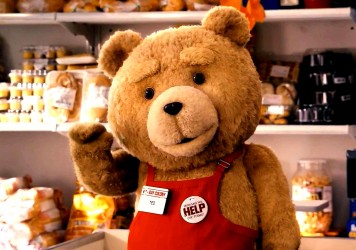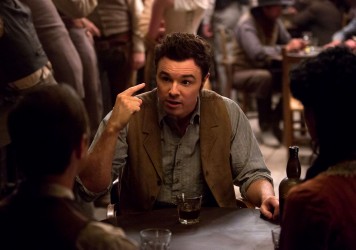Seth MacFarlane’s swear bear is back and more outrageous than ever in the year’s weakest comedy.
There is literally one joke in Ted 2. Without giving away the actual punchline, it occurs about 20 minutes in when Ted discovers his buddy John’s (Mark Wahlberg) substantial, meticulously catalogued porn stash. It’s the only time in the entire movie that writer/director Seth MacFarlane constructs an original gag around an appropriate expositional setup. Then again, MacFarlane doesn’t really do jokes. At least not in the conventional sense. He’d sooner spend five minutes indulging in a self-congratulatory showtunes number or drench a grown man in several gallons of semen than reward his audience with a well-earned payoff. If only a low laugh count was the worst of Ted 2’s problems.
Ever since Family Guy first aired back in 1999, MacFarlane’s see-if-it-sticks approach to comedy has been largely predicated on him being an equal opportunities offender. Yet there’s one person Seth MacFarlane apparently doesn’t see as fair game: Seth MacFarlane. Fans of the self-styled king of low-brow comedy may argue that his insecurities are there for all to see – his curious preoccupation with the male reproductive organ is the dominant recurring theme here – and besides, there isn’t much room for introspection or self-deprecation in a star-packed summer movie like Ted 2. But that’s an undue amount of slack to cut someone effectively making a gay panic movie in 2015 that also manages to be lazily misogynistic and willfully ignorant towards numerous hot button issues affecting America’s current sociopolitical climate.
MacFarlane’s whole schtick is serving up political incorrectness on a mass consumer scale, and Ted 2 again finds him inviting the largest slice of his target demographic pie (i.e. anyone with a white penis) to bask in their own persisting supremacy. To that end, MacFarlane makes no apologies for trying to cram as many cheap shots at various ethnic minorities and marginalised social groups into a two-hour mainstream comedy as possible. That the finished product isn’t particularly big or clever shouldn’t come as surprise.
At this stage in his career, the major concern for MacFarlane is that the novelty/shock factor of his earlier work has worn off, so too his ability to mine humour from random cutaways that typically have no bearing on the plot. The question for him now is whether to stick or twist. Because whichever way you slice it, we live in a world where mocking someone based on their class, gender, race or sexual orientation is an increasingly delicate business. Not least when you’re doing so from a position of white male privilege.
The first Ted – a sporadically funny, deeply flawed work – won audiences over with its distinct brand of stoner-based bromanticism, although anyone prepared to look a little deeper would have found a tiny beating heart beneath its filthy, fuzzy exterior. MacFarlane’s predictably crude sequel centres around Ted’s desire to be treated like a regular citizen, yet this time around his glaring lack of discernible human traits nullifies our investment in his plight.
To bring you up to speed, newlyweds Ted and Tami-Lynn (Jessica Barth) are going through a rocky patch and reason that a baby is the surest remedy. After discovering that Tami-Lynn’s ovaries are shot as a result of her previous drug addiction, the couple apply for adoption only to be rejected on the grounds that – in the eyes of the state – Ted is a piece of property, not a person. Humiliated and understandably aggrieved, Ted and John enlist the services of an inexperienced but willing junior attorney named Samantha (Amanda Seyfried) to fight for Ted’s rights.
It’s telling that smart, dynamic young Samantha ends up breaking her professional ethical code by hooking up with John (because a weed-smoking thirtysomething porn addict with no fixed income who counts a stuffed toy as his best friend is a real catch, eh ladies?). Unfortunately, MacFarlane living vicariously through his alpha protagonist while making clear his attitude towards women in the workplace is just the tip of his film’s narcissistic delusions.
The wider issue here stems from the notion that Ted (and by extension MacFarlane) has become a victim of constitutionally sanctioned discrimination. By repeatedly drawing comparisons between his cause and the Civil Rights Movement, Ted 2 goes out of its way to trivialise the kind of systematic inequality that has for too long been allowed to fester away inside American society. “Americans have fought for freedom and equality for all many times in the past,” booms the film’s official Twitter page. “Now we must stand together and #LegalizeTed.”
It’s not only the sentiment behind this faux moral grandstanding that stinks but the implication that the film it’s endorsing is one for the little guy. That someone might look at Ted striking a statesmanlike pose on Twitter and think, ‘Now there’s a cartoon bear I can believe in.’ That Ted is in some small way emblematic of the kind of adversity faced by millions of Americans every day. It’s not so much offensive as plain stupid. Especially given that no matter how much he tries to persuade everyone he has the capacity for compassion and empathy, as well as something to contribute to society, Ted’s actions are almost always motivated by selfish interests. MacFarlane wants us to love Ted in spite of his shortcomings, so why does he insist on having him behave like such a jerk?
Both Ted films and the flatulent vanity project that separates them, A Million Ways to Die in the West (a film that disproves the dictum that the meat is always in the middle of the sandwich), have so far enabled MacFarlane to satisfy his urge to perform autofellatio in public arenas. Trouble is, his routine is becoming increasingly hard to swallow. In the wake of Charleston and the Gamergate controversy (to name just a couple of incidents that have sparked furious national debate in recent months), the conversations around racial prejudice and gender inequality have taken on greater urgency. And yet there’s Ted, slumped on the sofa, bong in paw, glibly likening his struggle to that of LeVar Burton’s plantation slave in the seminal 1977 miniseries, Roots.
Examining his antipathy towards Seinfeld (and Seinfeld) in a recent article on maisonneuve.com, the writer and film critic Adam Nayman praises The Simpsons and Louie for presenting “a gallery of human types.” The brilliance of Louis CK’s comedy is that his onscreen alter ego is grounded by an unmistakable human fallibility. In other words, like Homer Simpson, Louie is an endearing asshole. By contrast, MacFarlane’s unrelenting hubris is staler than the pot-stained air in Ted’s apartment.
It’s hard to tell what, if anything, MacFarlane set out to achieve with Ted 2. It’s not a political film by any stretch, nor is it challenging or provocative in the way that great satire can be. It doesn’t push boundaries or take risks. All Ted 2 is really good for is celebrity cameos and tired stereotypes – that and keeping Sam “Flash Gordon” Jones in work. Another serious oversight on MacFarlane’s part is that his film feels tailor-made for teenage audiences while at the same time being littered with pop culture references that will carry no nostalgic value for anyone under the age of 30. Which adds an additional, unintended layer to the film’s alienating discourse.
Watching Ted 2, it’s hard to shake the feeling that MacFarlane is a spent force. In an early courtroom scene, Samantha closes her opening statement by imploring the jury not to become a footnote on the wrong side of history. It may be premature to deliver a final verdict on MacFarlane, but there’s enough evidence here to suggest he’s got nothing left to offer as a live-action director.
Published 7 Jul 2015
The first Ted was enjoyably crass.
As irrelevant as it is unfunny.
#StopTed.

The directorial debut from Family Guy creator Seth MacFarlane is as deliciously salty as it is unexpectedly sweet.

Marvel’s lewd crude crime-fighting dude, as played by Ryan Reynolds, is as unfunny as he is uninteresting.

Seth MacFarlane has opted to make a comedy western as his follow-up to Ted. It’s an epic fail on every conceivable level.